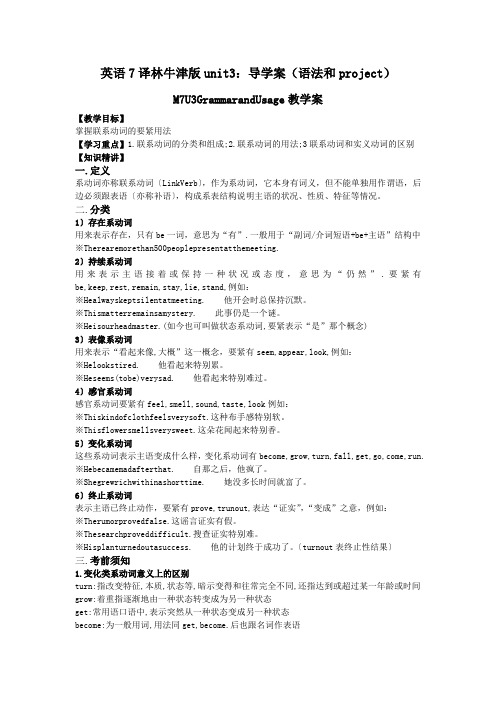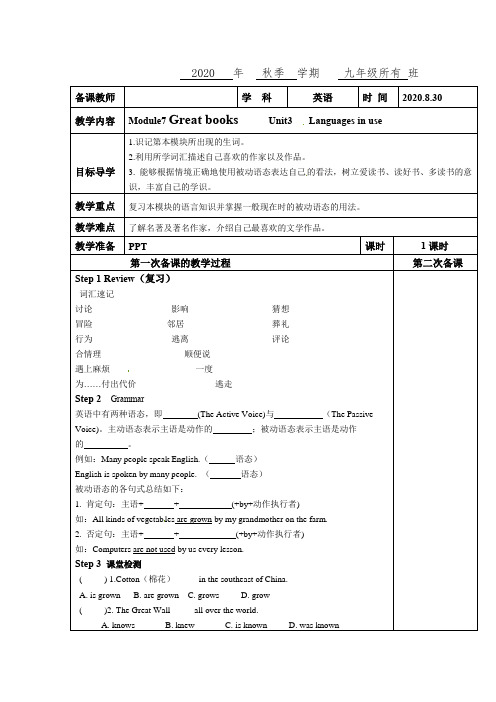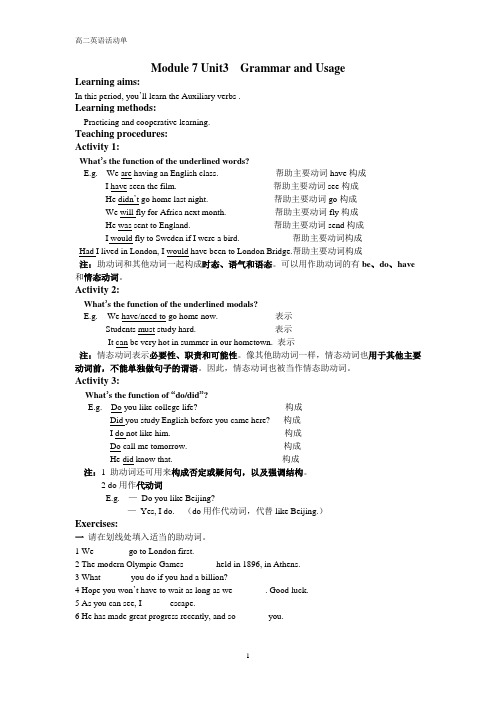M7U3_grammar学案
M7U3 语法

2021届高二英语Module 7 Unit3 Grammar and usage 导学案编制人顾国洋审核人朱宗萍I.Learning aims:1.To learn auxiliary verbs by studying some sentences;2.To know the features of auxiliary verbs ;3.To grasp the types and usages of auxiliary verbs .II. Individual learning before classGo through Page 40and 41 , fill in the blanks:在他们完成伟大的事情之前先克服失败_______________________________________ 从一开始就发现成功____________________ 完成800多幅绘画作品___________________ 因为能力不足而被解雇______________________ 为我们树立好榜样__________________放弃自己的梦想_______________________ 生我的气______________________关闭电源、断电__________________ 因没有赴约向他道歉_______________________ III. Teaching ProceduresTask1. 常见的助动词最常用的助动词有:_______, ________, _________, __________, _________, _______, _________。
助动词be的用法:1. be + 现在分词,构成___________时态。
如:They are having a meeting.他们正在开会。
English is becoming more and moreimportant.英语现在越来越重要。
英语7译林牛津版unit3:导学案(语法和project)

英语7译林牛津版unit3:导学案(语法和project)M7U3GrammarandUsage教学案【教学目标】掌握联系动词的要紧用法【学习重点】1.联系动词的分类和组成;2.联系动词的用法;3联系动词和实义动词的区别【知识精讲】一.定义系动词亦称联系动词〔LinkVerb〕,作为系动词,它本身有词义,但不能单独用作谓语,后边必须跟表语〔亦称补语〕,构成系表结构说明主语的状况、性质、特征等情况。
二.分类1〕存在系动词用来表示存在,只有be一词,意思为“有”.一般用于“副词/介词短语+be+主语”结构中※Therearemorethan500peoplepresentatthemeeting.2〕持续系动词用来表示主语接着或保持一种状况或态度,意思为“仍然”.要紧有be,keep,rest,remain,stay,lie,stand,例如:※Healwayskeptsilentatmeeting. 他开会时总保持沉默。
※Thismatterremainsamystery. 此事仍是一个谜。
※Heisourheadmaster.(如今也可叫做状态系动词,要紧表示“是”那个概念)3〕表像系动词用来表示“看起来像,大概”这一概念,要紧有seem,appear,look,例如:※Helookstired. 他看起来特别累。
※Heseems(tobe)verysad. 他看起来特别难过。
4〕感官系动词感官系动词要紧有feel,smell,sound,taste,look例如:※Thiskindofclothfeelsverysoft.这种布手感特别软。
※Thisflowersmellsverysweet.这朵花闻起来特别香。
5〕变化系动词这些系动词表示主语变成什么样,变化系动词有become,grow,turn,fall,get,go,come,run. ※Hebecamemadafterthat. 自那之后,他疯了。
外研版九年级上册教案M7U3

2020 年秋季学期九年级所有班Module7 Great books Unit3 Languages in use1.识记第本模块所出现的生词。
2.利用所学词汇描述自己喜欢的作家以及作品。
3. 能够根据情境正确地使用被动语态表达自己的看法,树立爱读书、读好书、多读书的意识,丰富自己的学识。
第一次备课的教学过程Step 1 Review(复习)词汇速记讨论_______________ 影响_______________ 猜想___________________冒险_________________邻居_________________ 葬礼_____________________行为________________ 逃离_________________ 评论_____________________合情理___________________顺便说______________________遇上麻烦__________________ 一度________________________为……付出代价__________________逃走______________________Step 2 Grammar英语中有两种语态,即(The Active Voice)与(The PassiveVoice)。
主动语态表示主语是动作的;被动语态表示主语是动作的。
例如:Many people speak English.(语态)English is spoken by many people. (语态)被动语态的各句式总结如下:1. 肯定句:主语+ + (+by+动作执行者)如:All kinds of vegetab les are grown by my grandmother on the farm.2. 否定句:主语+ + (+by+动作执行者)如:Computers are not used by us every lesson.Step 3 课堂检测( ) 1.Cotton(棉花)____ in the southeast of China.A. is grownB. are grownC. growsD. grow( )2. The Great Wall ___ _ all over the world.A. knowsB. knewC. is knownD. was known( )3. This English song __ _ by the girls after class.A.often singsB. often sangC. is often sangD. is often sun( )4. This kind of car ___ in Japan.A. makesB. madeC. is makingD. is made( )5. New computers ___ all over the worl d.A. is usedB. are usingC. are usedD. have usedStep4.【Homework】Fill in the blanks with the correct form of the words.1. Jackie Chan _ (know) as a great film star.2. Lunyu __ (think) to be one of the greatest Chinese books.3. Would you like (read) The Adventures of Tom Sawyer?4. The students often (tell) to take good care of their desks and chairs.5. Don’t you know Confucius is a famous _ (think) of China?6. When did you read the article _ (call) “Great Books”?7. English _ (learn) as the second language by most students in China.8. Vegetables, eggs and fruit __ (sell) in this shop9. The flowers __ (water) by Lingling every day.10. These kinds of machines (make) in ShanghaiUnit3 Languages in use被动语态:1. 肯定句:主语+be+动词过去分词(+by+动作执行者)2. 否定句:主语+be not+动词过去分词(+by+动作执行者)3. 一般疑问句:be +主语+动词过去分词(+by+动作执行者)4. 特殊疑问句:特殊疑问词+ be +主语+动词过去分词(+by+动作执行者)。
M7U3GrammarSs

Module 7 Unit3 Grammar and UsageLearning aims:In this period, you’ll learn the Auxiliary verbs .Learning methods:Practicing and cooperative learning.Teaching procedures:Activity 1:What’s the function of the underlined words?E.g. We are having an English class. 帮助主要动词have构成___________I have seen the film. 帮助主要动词see构成_____________He didn’t go home last night. 帮助主要动词go构成_____________We will fly for Africa next month. 帮助主要动词fly构成_____________ He was sent to England. 帮助主要动词send构成____________I would fly to Sweden if I were a bird. 帮助主要动词构成____________ Had I lived in London, I would have been to London Bridge.帮助主要动词构成____________ 注:助动词和其他动词一起构成时态、语气和语态。
可以用作助动词的有be、do、have 和情态动词。
Activity 2:What’s the function of the underlined modals?E.g. We have/need to go home now. 表示_____________Students must study hard. 表示_____________It can be very hot in summer in our hometown. 表示____________注:情态动词表示必要性、职责和可能性。
Module 3 of Book VII Grammar 外研版选修7学案

高二英语“312”自主·导学案年级Senior II 科目English 时间Mar 20th , 2014课题:Book VII Module3 Literature--Grammar第4课时(共5课时)主备人:张永丽审核人:高岐宏编号:Book VII 06【课程标准】1.Be able to recognize the structure of Inversion used for emphasis in sentences .2.Be able to master and use the structure to emphasize some important. part in a sentence by practice.【学习目标】1. What dose the structure of inversion look like?2. When do we use it?3. How can we use it in practice?【目标导学】1. Complete activity1 on page32 of students’ book .2.Look at the following sentences and think about the use of inversion once again.•Never have I seen such a performance.•Not until the child fell asleep did the mother leave the room.•Not only did he refuse the gift, he also severely criticized the sender.•Hardly had she gone out when a student came to visit her.•No sooner had she gone out than a student came to visit her.【规律总结】Summarize when we use the inversion structure.(Group work)1)句首为否定或半否定的词语:2)以否定词开头的连词短语:3)only在句首要倒装的情况:【拓展提升】Other means of inversion( Group work)1)2)3)Emphatic Sentence( ) Activity1 0n Page35 of students book.注意:①强调句型的结构为It is / was … that / who …, 用来强调除谓语以外的任何成份。
高中英语选修七:M7U3 Grammar 课件

• ①Before I made a decision, I thought carefully about it.
• __我__做_的__决_定__都_是__经__过_再__三_考__虑__的_。___
was found murdered.
【总结】5个重点句型 ①_I_t _b_e_+_时__间__段_+_b_e_f_o_r_e_…__过__了__…__才__;_没__过__…__就______ ②_It_b_e__+_时_间__点__+_w_h_e_n_…____当_…__的__时__候____强__调__句__型____
M7U3 Grammar
前置性补偿
• 1.没有具体的目标 __w_ith_o_u_t a__sp_e_ci_fi_c _go_a_l _____
• 2. 把某物下载到你电脑上 __d_ow_n_l_oa_d_s_th_o_n_to__yo_u_r _co_mputer
• 3.点击刷新按钮 __c_lic_k_o_n_th_e_r_ef_re_s_h_b_u_tto_n_______
• 【走近高考】 • ⑴. -Did your boss phone you against the next
day? • -No, it was a week _C______ he gave me a
second call.
• A. that B. when C. before D. after • ⑵.I’m sorry you’ve been waiting so long, but
• ②Put that away before it gets broken. • __把__它__收_好__,_免__得_砸__碎__了_。_________
人教版英语选修七 M7U3学案Period4~6
一、自主预习(Preview):Pre-view the grammar.二.、课前检测(Pre-class test):三.、新知导学(Guiding):V-ing形式否定形式为not doing,具有动词和名词的性质,在句中起名词作用,可作主语、宾语、表语; 定语、状语和宾语补足语,但不能单独作谓语。
1.作主语表示抽象的经常性的意义。
_________________________ made him safe. 在水中被举起让他感到安全了。
__________________ is not a good thing. 被惩罚不是一件好事。
2. 作表语What made his parents happy was _______________________________.让他父母高兴的是他被名牌大学录取了。
3. 作宾语常这样用的动词有:admit;excuse;postpone;anticipate;fancy;practice;appreciate ;finish;prevent;avoid;forbid;propose;consider;forgive;delay;imagine;deny;resist;keep;risk;dislike;mind;miss;suggest;enjoy;pardon;escape;instead of;look forward to;object to;keep on; see about; take toHe narrowly escaped _________________________. 他差一点被车撞着。
PS:在_______________________________等动词后,可用动名词的主动形式表示被动意义,相当于to be done.4. 作宾语补足语He often watched the boats _________________________. 他常常看到轮船卸货。
2022年教学教材《外研版Book7 Module3语法精品学案》优秀教案
外研版Boo7 Modue3语法精品学案〔Grammar 倒装句,强调句〕倒装语序分为“全部倒装〞和“局部倒装〞。
在全部倒装的句子中,整个谓语都放在主语的前面;在局部倒装的句子中,只是谓语中的一局部〔如助动词、情态动词或系动词be等〕放在主语前面,其余局部仍放在主语后面。
下面将常见的倒装情况分述如下:一、由there, here 或now 等引起,谓语为come〔或go〕的句子,例如:There come the bu!There goe the be!Here come Mar!Now come our turn注:如果主语为人称代词,仍用自然语序,例如:There he come!Here he come!二、由then 引起,谓语为come〔或foow〕的句子,例如:Then came a new difficutThen foowed eight ear of the Anti-JaBeijinge five minute earier, I woud have met the famou cientit If I had come five minute …Had I been informed earier, I coud have done omethingShoud anone ca, te him to wait for me hereWere I ten ear ounger, I woud be abe to cimb to the toChina e over to have a ta with him in thoe daA Sedom did I have timeB I had edom timeC Sedom had I timeD Had I edom time2 No ooner had the teacher eft the caroom __ the howA oneB thatC whatD it10 It wa on when I reread hi recent ____ I began to areciate their beaut 98全国A untiB thenC thatD oKe: 1-5 BADCA 6-10 CDBBc。
英语:Unit 3 grammar教案(牛津译林版选修7)
U3 M7 Grammar&usageLearning aims:1。
After learning Linking verbs, the students will know about some basic information about linking verbs(words used as linking verbs;function of linking verbs; predicative after linking verbs);2。
After learning Linking verbs, the students will be able to summarize usages of common and important linking verbs;3。
After learning Linking verbs, the students will apply what they’ve learned about linking verbs.Learning procedures:Step 1 Lead—inQ:What is a linking verb?A: A linking verb is a word used to connect the subject of a sentence to further information about the state which the subject is in。
Step 2 Presentation:1。
“存在”类:表示存在或具有某种特征或状态.常见的有: be,lie, exist,stand,live等。
这类连系动词强调“存在”。
主要用于“副词/介词短语+be +主语"句型中,语序为倒装语序,即谓语动词单复数取决于后面的主语。
Eg. There are three chairs,two tables and a bike in the house.Here is the change for you.Around the outside walls_are towers and in front of them lies a river。
外研版八年级上册Module 7 unit3 语法课教案
Scanning
Scanningthe passageto get details and finish activity 3.
1.Asking students finish activity 3 and check the answers.
Careful reading
1.Reading carefully and get detailsand finishing the tasks.
Step 5
Homework
(1mins)
Finish the homework afterclass.
1.Reviewpass continuous tense.
2. Finish P46-47 (同步指导)
To help studentsexpandthe extra-curricular knowledge.
2.Finishactivity 4and answer questions.
3.Learn some important words and expressions..
1.Asking the questions about the text and showing the answers.
Where were Alice and her sister?
- 1、下载文档前请自行甄别文档内容的完整性,平台不提供额外的编辑、内容补充、找答案等附加服务。
- 2、"仅部分预览"的文档,不可在线预览部分如存在完整性等问题,可反馈申请退款(可完整预览的文档不适用该条件!)。
- 3、如文档侵犯您的权益,请联系客服反馈,我们会尽快为您处理(人工客服工作时间:9:00-18:30)。
M7U3 Grammar
Auxiliary verbs
Learning procedures:
一.概念及作用:
1. 协助主要动词构成谓语动词的词叫助动词。
被协助的动词称做主要动词。
助动词自身没有__________,_____________ 单独使用。
Eg. He doesn’t like English. 此句中__________________是助动词,无词义;
______________是主要动词,有词义。
2. 作用
1)表示_________________ eg. He has got married.
2) 表示_________________ eg. He was sent to England.
3) 构成_________________ eg. Did you study English before you came here?
4) 构成_________________ eg. I don’t like him.
5) 用于_________________ eg. He did know that.
二.相关知识点精讲:
分类:be, do, have, phrasal auxiliary verb
be (am/is/are/was/were/been) do (does/did) have(has/had)
modals(shall/should/will/would/can/ could/may/might/must/need/dare )
A phrasal auxiliary verb(have (got) to, had better/would sooner/rather (… than)/cannot (help) but/be (not) to/be supposed to/ought to/used to/be about to/be able to)
1. 助动词be的用法
1)be +现在分词,构成____________时态。
They are having a meeting.
2)be + 过去分词,构成______________语态。
English is taught throughout the world. 3)be + 动词不定式(be to do)
a. 表示______________________________。
He is to go to New Yor k next week.. 说明:这种用法也可以说成是一种将来时态表达法。
b. 表示___________________。
You are to explain this.对此你要做出解释。
c. 表示___________________。
Who is to go there?
d. 表示相约、商定。
We are_______________(meet) at the school gate at seven tomorrow morning.
2. 助动词have的用法
1)have +过去分词,构成_____________时态。
By the end of last month, they had finished half of their work.
2)have + been +现在分词,构成____________________。
I have been studying English for ten years.
3)have +been +过去分词,构成_________________语态。
English has been taught in China for many years.
3.助动词do 的用法
1)构成一般疑问句。
Do you want to pass the CET?
2)do + not 构成否定句。
I do not want to be criticized.
3)构成否定________________(只用do,不用did和does)。
Don't be so absent-minded.
4)放在动词原形前,加强该动词的______________。
Do come to my birthday party.
I ___________ __________ there.(我确实去那儿了)
5)用于倒装句
Only when we begin our college life _________ __________ __________the importance of English.(我们才能意识到)
Never _________ ______ travelled by plane before.(他从未乘飞机旅行过)
6)用做代动词
---Do you like Beijing?
---Yes, I ______.(do用作代动词,代替___________.)
4. 重要的助动词短语
1) had better + ___________,其否定形式为_________________
2) would rather/ sooner + ___________,其否定形式为_________________,
相关句型“宁愿做...不愿做...”:___________________________/
________________________
3) used to do其否定形式为_________________或______________________,反意疑问句形式为________________或_______________________(以he为例);
过去这家商店星期天营业吗?
---________________________ /________________________open on Sundays?
---Yes, it ________________/ No, it _____________.
4) could not (help) but___________只能做某事;
be supposed to______________;
be about to ___________此短语不与_________________________连用;
was able to= ______________ ___/ ___________________
三、即时巩固:
1.The factory used 65 percent of the raw materials, the rest of which _____(be) saved for other purposes.
2. Listening to loud music at rock concerts _____ (cause) hearing loss in some teenagers.。
